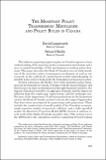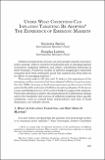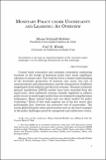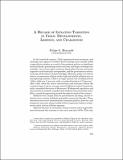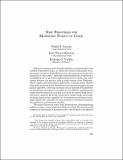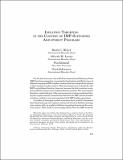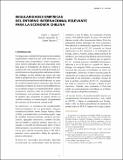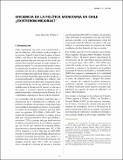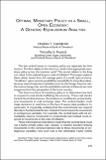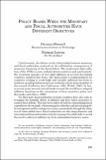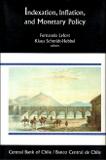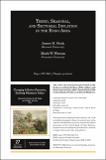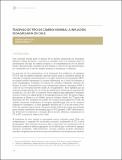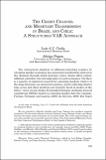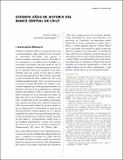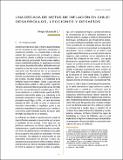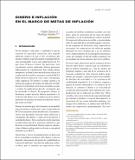Search
Now showing items 1-20 of 76
The monetary policy transmission mechanism and policy rules in Canada
The inflation targeting regime in place in Canada requires a clear understanding of the monetary policy transmission mechanism and a way to exploit knowledge of that mechanism in making policy decisions. This paper describes the Bank of Canada's current undestanding of the monetary policy transmission ...
The monetary transmission mechanism in the United Kingdom: pass-through and policy rules
A number of recent papers have used policy simulations from small empirical macroeconomic models to assess the efficacy of inflation targeting or, more precisely, inflation forecast targeting (Svensson, 1997a). These include Rudebush and Svensson (1999). The models used to undertake these simulations ...
Under what conditions can inflation targeting be adopted? The experience of emerging markets
Inflation targeting has become an increasingly popular monetary policy strategy, with 21 countries (8 industrial and 13 emerging market economies) targeting inflation and others considering following in their footsteps. Numerous studies of inflation targeting in industrial countries have been conducted, ...
Monetary policy under uncertainty and learning: an overview
Central bank economists and academic economists conducting research on the design of monetary policy have made significant advances in recent years. This work has led to a clearer understanding of the desirable properties of interest rate rules, the role of announcements and communication, and the ...
A decadeof inflation targeting in Chile: developments, lessons, and challenges
In the twentieth century, Chile experienced most monetary and exchange rate regimes. Periods of fixed exchange rates usually ended in speculative attacks as a result of inconsistent policies or significant external shocks, generating serious real costs and larger exchange rate volatility.
New frontiers for menetary policy in Chile
Inflation targeting can be broadly defined as a framework for the conduct of MONETARY POLICY in which the central bank guides its instruments in order to hold inflation near a preannounced target or to bring back to the target. Although understanding the framework is straightfoward, its practical ...
Inflation targeting in the context of IMF-Supported adjustment programs
For the last few years, the staff of the Iternational Monetary Fund (IMF) has been engaged in assessing the functioning and effectiveness of inflation targeting in IMF member countries that have adopted this scheme as their monetary policy anchor. This involvement was restricted to the IMF's surveillance ...
Regularidades empíricas del entorno internacional relevante para la economía Chilena
En el presente estudio se analizan regularidades macroeconómicas dentro de los grandes bloques económicos (EE.UU., Europa y Japón) y se describe la interacción entre variables relevantes de estos bloques y su relación con variables de interés para la economía Chilena como precios de productos básicos, ...
Eficiencia de la política monetaria en Chile ¿existieron mejoras?
La volatilidad del producto y de la tasa de inflación disminuyó de manera importante en los últimos años. Esta mejora del desempeño económico se puede explicar tanto por una caída de los shocks que enfrenta la economía como por una mejora en la política monetaria. Este documento explora la contribución ...
Optimal monetary policy in a small, open economy: a general-equilibrium analysis
The two central issues in monetary policy are separated by time horizon. The first relates to the short run: what is the appropriate monetary policy across the business cycle? The second relates to the long run: waht is the optimal long-run rate of inflation? This paper explores these classic issues ...
Policy biases when the monetary and fiscal authorities have different objectives
Until recently, the debate on the relationship between monetary and fiscal authorities centered on the inflationary consequences of mentary financing of the fiscal deficit. The moderately high inflation of the 1970s in some industrialized countries and, particularly, the recurring episodes of very ...
Indexation, inflation, and monetary policy
Although indexation policies and practices are common in many markets and economies, their implications for market efficiency and price stabilization remain controversial. This book contributes to the literature on indexation and inflation by including nine articles that are at the research frontier ...
Trend, seasonal, and sectorial inflation in the Euro Area
A central focus of monetary policy is the underlying rate of inflation
that might be expected to prevail over a horizon of one or two years.
Because inflation is estimated from noisy data, the estimation of
this underlying rate of inflation, which we refer to as trend inflation,
requires statistical ...
Traspaso de tipo de cambio nominal a inflación desagregada en Chile
Una cuestión central para el manejo de la política monetaria en economías abiertas a flujos de bienes y servicios es entender cuál es la relación entre los movimientos del tipo de cambio nominal y el comportamiento de los precios locales. En particular, entender en qué medida, y a través de qué ...
Fiscal inflation and cosmetic defaults in a small open economy
For a small open economy, maintaining a stable exchange rate and moderate levels of inflation is often a goal of primary importance. At the same time, the profession has recognized the tight link between fiscal and monetary policies in determining inflation dynamics. Thus, the goal of a stable exchange ...
Inflation targeting under political pressure
Historically, many emerging economies, particularly in Latin America, battled against persistently high and volatile inflation. Today, emerging economies continue to experience higher inflation than developed ones, and their central banks deviate more frequently from inflation targets. These patterns ...
The credit channel and monetary transmission in Brazil and Chile: a structured VAR approach
The widespread adoption of inflation-targeting regimes by emerging market economies has generated considerable interest in the channels through which monetary policy shocks affect output inflation and other relevant aggregates in such economies. Yet there is a paucity of empirical research for emerging ...
Ochenta años de historia del Banco Central de Chile
El Banco Central de Chile se creó en 1925, para 'dotar al país de una institución que estabilice la moneda y regule las tasas de intereses y descuentos, para evitar perturbaciones en el desenvolvimiento industrial y financiero de la Nación y fomentar su progreso económico' (Decreto Ley Nº 486, 22 de ...
Una década de metas de inflación en Chile: desarrollos, lecciones y desafíos
Chile fue uno de los primeros países del mundo en adoptar un régimen monetario basado en una meta de inflación anual explícita y pública, incluso cuando el término 'meta de inflación' ni siquiera se había formalizado en la literatura económica. Una historia de alta inflación hacía recomendable la ...
Dinero e inflación en el marco de metas de inflación
Este trabajo examina el rol del dinero en el actual marco de metas de inflación, en vista del importante crecimiento que ha mostrado el M1A en el último tiempo. Se analiza, desde un punto de vista conceptual, la relación que existe entre dinero e inflación, así como la interpretación que pueden tener ...

